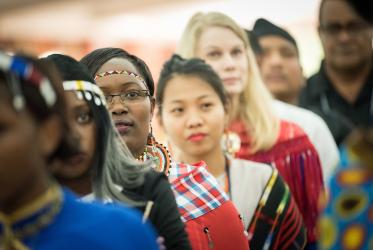While reflecting on the theme of the World Council of Churches (WCC) upcoming assembly in Busan, Indian churches stressed the importance of celebrating life in fullness, vibrancy, dynamism and fervour irrespective of caste, creed, colour, class, gender or ethnicity.
Around 70 church leaders shared these reflections in a WCC pre-assembly consultation organized by the National Council of Churches in India (NCCI), held from 16-18 August in Bangalore, India.
The 10th Assembly of the WCC will address the theme “God of life, lead us to justice and peace”, from 30 October to 8 November in Busan, Republic of Korea.
The event in Bangalore triggered dialogue on the WCC assembly theme, focusing on concerns of the Indian churches and articulating challenges faced by the ecumenical movement in local contexts.
Human right activists working on social issues also addressed the consultation and reflected on the assembly theme from their perspectives of struggle for justice and peace.
“Justice and peace are to be established not for a life of comfort and prosperity but for the fullness of life of God’s entire creation,” said Bishop Dr Taranath Sagar, president of the NCCI, in his opening speech.
“God’s call to be partners in his mission to establish peace with justice in the world is a call to uphold the human dignity and integrity of all God’s creation,” he added.
Rev. Dr Sunil M. Caleb, principal of the Bishop’s College in Calcutta, said, “As we groan in the midst of multiple crises facing the world today, we at the grass roots are called to display new patterns of life and action.”
The powers of evil, he continued, can only be resisted through deep spirituality and dependence on the God of life who seeks justice and peace for all people.
Local perspectives on peace and justice
Dhirendra Panda, a human rights activist from Odisha state asked the churches to support people’s struggles against companies like Pohang Iron and Steel Company (POSCO) from South Korea, a corporation which is conducting a multibillion dollar steel and port project in Odisha.
“Our lands are going to be taken away by the POSCO. The Odisha state is using all its machinery to acquire land for POSCO. Several human rights violations have taken place,” he explained.
“Since, POSCO is a South Korean Company, we earnestly request the NCCI to campaign with the WCC and Korean churches to request that POSCO withdraw from the iron and mining project,” added Panda.
At the consultation an orientation session on the WCC assembly was conducted by Dr Mathews George Chunakara, director of the WCC’s Commission of the Churches on International Affairs. He said that the theme of the assembly is “immensely relevant to the Asian contexts where peoples’ struggle for justice and peace is pertinent and a large number of Asians are denied peace with justice.”
Rev. Dr Roger Gaikwad, general secretary of the NCCI, shared that the Indian participants will act in various capacities at the WCC’s assembly. They will be a contributing resource by speaking from their rich experiences and theological insights derived from Indian contexts, he added.
Among other speakers at the consultation were Fr Jacob Joseph, Dr Awala Longkumer, Rev. Chandramani Khanna, Ms Sundari and Ms Milret, Rev. Christopher Rajkumar, Ms Jyothi Raj, Rev. Dr Dexter S. Maben, Rev. Dr Vincent Rajkumar, Rev. Dr Vincent Manoharan, Dr Aruna Gnanadason, Mr Inbara, Mr Wilfred D'Costa, Rev. Prem Mithra, Rev. Dr Samuel W Meshack, Rev. Dr Margret Kalaiselvi, Ms Christina Dhanraj, Mr Justine Johnny, Rev. Raj Bharath Patta, Bishop Nelson Lakra, Dr Rini Ralte and Rev. Dr P.B.M Basaiawmoit, Ms Joysia, Rev. Dr Praveen Perumalla and Rev. Dr Peniel Rajkumar.
Website of the National Council of Churches in India
High resolution photos available via photos.oikoumene.org










